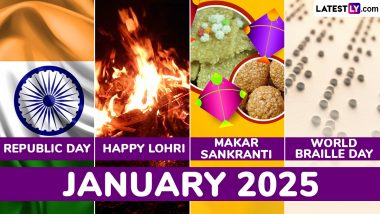Harela is an auspicious Hindu festival celebrated in Uttarakhand and some regions of Himachal Pradesh. The Harela festival is very popular in the Kumaun region of Uttarakhand and is celebrated with great enthusiasm and fervour. Harela falls on the first day of Shravan-Maas (Shravan-Sankranti/Kark-Sankranti), as per the Hindu Luni-Solar calendar, marking the onset of the monsoon season. Harela 2024 is celebrated on July 16. It is a festival of peace, prosperity, and greenery and coincides with the religious celebration of the wedding of Lord Shiva and Goddess Parvati. Hence, it has great significance. Sawan (Shravan) 2024 Start and End Dates: When Is Sawan Maas Beginning? Know The Significance, Traditions and Rituals Related to The Holy Month Dedicated to Lord Shiva.
Harela means ‘Day of Green’, and hence, agriculture-based communities in the hill states consider the festival as highly auspicious, as it marks the beginning of the sowing cycle. The festival is popular by the names Hariyali/Rihyali in Kangra, Shimla and Sirmour regions, and Dakhrain in Jubbal and Kinnaur regions of Himachal Pradesh. On this day, people pray for a good harvest and prosperity. Everything You Need To Know About Shravan Maas, the Month Dedicated to the Worship of Lord Shiva.
Harela 2024 Date
Harela 2024 is celebrated on Tuesday, July 16.
Harela History and Significance
Harela holds great significance in the Kumaon region of Uttarakhand as the festival symbolises a new harvest and the rainy season. On this day, schools in Uttarakhand often encourage their students to plant saplings either at home, school or with the support of local officials. In Kumaun, the two celebrations during Navarati – first during Chaitra Navratri in the month of Chaitra and second during Sharad Navratri in the month of Ashwin, are also considered to be connected to Harela. This is followed by Bhaitauli or Bhitauli wherein gifts are given to girls of the family.
The Shravan Harela is celebrated as the first day (Kark Sankranti) of the Hindu calendar month of Shravan, which usually falls in July. The primary belief of this festival lies in the origins of Neo-lithic fertility festivals, which were marked as the religious celebration of the wedding of Lord Shiva and Goddess Parvati.
(The above story first appeared on LatestLY on Jul 15, 2024 09:03 PM IST. For more news and updates on politics, world, sports, entertainment and lifestyle, log on to our website latestly.com).













 Quickly
Quickly




















